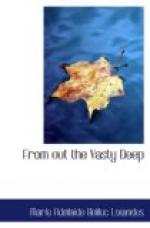Blanche looked dubiously at the girl. “That’s the sort of thing one can never know about a man,” she said slowly.
“The woman I mean”—Bubbles was going on rather quickly and breathlessly now—“is not a young woman. She’s about sixty, I should think. She has a plain, powerful face, with a lot of grey hair turned off her forehead.”
“Have you ever seen such a person with Lionel?” asked Miss Farrow.
“No, not exactly.”
“What do you mean, Bubbles?”
“I can’t quite explain what I mean. Even before the seance I seemed to feel her last night. I suppose you would say I saw her in his mind—in what some people would call his inner consciousness.”
Blanche stared at the girl uncomfortably. “D’you mean you can always see what people are thinking of?” she exclaimed.
Bubbles burst out laughing. “Of course I can’t! You needn’t feel nervous.” She went up to her aunt, and thrust her hand through the other’s arm. “Don’t be worried, old thing”—she spoke very affectionately. “I’ve promised Bill that I’ll put everything of the kind he and father disapprove of away—just while I’m here! But still, Blanche—”
Miss Farrow had never seen the girl in this serious, thoughtful mood before. “Yes,” she said. “Yes, Bubbles?”
“Oh, well, I only just wanted to quote something to you that’s rather hackneyed.”
“Hackneyed?” repeated Miss Farrow.
“There are more things in heaven and earth, my dear, than are dreamt of in your philosophy.”
Blanche Farrow felt a little piqued. “I’ve never doubted that,” she said curtly.
CHAPTER VII
Meanwhile, one of the subjects of their discussion was thoroughly enjoying her tour of Wyndfell Hall; and as she entered each of the curious, stately rooms upstairs and down, Helen Brabazon uttered an exclamation of pleasure and rather naive admiration. Not a corner or a passage-way but had some fine piece of old furniture, some exquisite needle-picture or panel of tapestry, in keeping with the general character of the ancient dwelling place.
Her cicerone would have enjoyed their progress more had it not been that his companion frequently referred to his late wife. “How strange that Milly did not love this wonderful old house!” she exclaimed. And then, when they had gone a little further on, she suddenly asked: “I wish you’d tell me which was Milly’s room? Surely she must have been happy here sometimes!”
But the new master of Wyndfell Hall had never even thought of asking which had been his wife’s room. And, on seeing the troubled, embarrassed look which crossed his face while he confessed his ignorance, Helen felt sharply sorry that she had asked the question. To his relief, she spoke no more of Milly, and of Milly’s association with the house which so charmed and attracted her.




